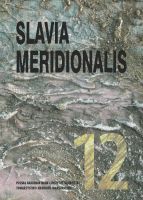Przekład jako spotkanie różnych tożsamości
Translation as an encounter of different identities
Author(s): Alicja PstygaSubject(s): Language and Literature Studies
Published by: Instytut Slawistyki Polskiej Akademii Nauk
Keywords: national identity; translation; cultural and language barriers; multiculturalism; intercultural competence
Summary/Abstract: The interest in the national identity of Slavic people is related to the processes of social, political and ideological changes as well as to European integration and globalization. The question of the national identity of Slavic people concerns similarities and differences between them, influenced by the specific perception and categorization of reality. After the period of forced transnational integration and constructed linguistic and cultural national communi¬ties, the Slavic linguistic views of the world are diversified. Both for Macedonian and Polish people, language is one of the exponents of national identity. Macedonian literary texts trans¬lated into Polish enable readers to encounter different cultural phenomena, reflected in artis¬tic visions and symbols. Their perception is quite difficult as it requires profound knowledge and intercultural competence. As examples, we will consider Polish translations of important Macedonian novels, Tvrdoglavi (Polish title: Zawzięci) by Slavko Janevski, Vremeto na kozite (Polish title: Czasy kóz) by Luan Starova, Razgovor so Spinoza: roman pajažina by Goce Smi¬levski (Polish title: Rozmowa ze Spinozą: powieść–pajęczyna) and Skriena kamera (Polish title: Ukryta kamera) by Lidija Dimkovska.
Journal: Slavia Meridionalis
- Issue Year: 2012
- Issue No: 12
- Page Range: 235-247
- Page Count: 13
- Language: Polish

